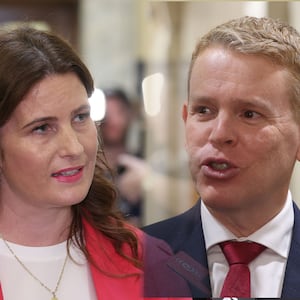Politics
Nicola Willis Challenges Labour and Greens on Fiscal Responsibility

Finance Minister Nicola Willis initiated a significant political confrontation on March 12, 2024, by accusing Labour leader Chris Hipkins and Green co-leader Chloë Swarbrick of fiscal irresponsibility. This clash emerged during a press release in which Willis highlighted the government’s maintenance of its AA+ credit rating affirmed by Fitch Ratings, despite ongoing pressures on New Zealand’s public finances.
In her statement, Willis expressed pride in the government’s fiscal management. She noted that New Zealand’s historic ability to borrow at reasonable rates has stemmed from a reputation for responsible public money management. “Historically, New Zealand governments have been able to borrow at reasonable rates because of their reputation for being responsible managers of public money, but that is not something that should be taken for granted,” Willis stated.
The Finance Minister leveraged Fitch’s commentary to criticize the Labour Party and the wider opposition. She quoted a warning from Fitch regarding the potential impact of fiscal mismanagement on New Zealand’s creditworthiness. “Fitch warns that ‘evidence of a weakening in the culture of fiscal commitment to fiscal responsibility would affect creditworthiness,’” she emphasized, framing her argument around the need for strict adherence to fiscal responsibility.
Political Repercussions and Responses
The exchange heightened tensions within Parliament, as both Hipkins and Swarbrick responded to Willis’s assertions. Hipkins defended the Labour Party’s fiscal policies, arguing that they prioritize social welfare while maintaining economic stability. He emphasized the importance of investing in crucial services, particularly in health and education, as a pathway to sustainable growth.
Swarbrick also countered the accusations, stressing that the Green Party’s initiatives are designed to address the pressing issues of climate change and social equity. She argued that fiscal responsibility should not come at the expense of essential public services or environmental sustainability.
The debate over fiscal management reflects broader concerns regarding New Zealand’s economic outlook. Recent challenges, including inflation and rising public debt, have prompted calls for a reassessment of spending priorities.
Implications for New Zealand’s Economic Future
As the political discourse continues, the implications for New Zealand’s economy remain a focal point. Maintaining a strong credit rating is crucial for the government, influencing borrowing costs and overall economic confidence. With Fitch highlighting the importance of a commitment to fiscal responsibility, the government faces intense scrutiny over its financial strategies.
The outcome of this political battle could significantly affect future policy decisions and the public’s perception of the parties involved. As New Zealand navigates its economic challenges, the government’s approach to fiscal management will be critical in shaping the nation’s financial landscape in the coming years.
In summary, the clash between Willis, Hipkins, and Swarbrick underscores the complex dynamics of fiscal policy in New Zealand, reflecting differing priorities and approaches to governance during a time of economic uncertainty.
-

 Sports1 month ago
Sports1 month agoNetball New Zealand Stands Down Dame Noeline Taurua for Series
-

 Entertainment1 month ago
Entertainment1 month agoTributes Pour In for Lachlan Rofe, Reality Star, Dead at 47
-

 Entertainment1 week ago
Entertainment1 week agoNew ‘Maverick’ Chaser Joins Beat the Chasers Season Finale
-

 Sports1 month ago
Sports1 month agoSilver Ferns Legend Laura Langman Criticizes Team’s Attitude
-

 Entertainment2 months ago
Entertainment2 months agoKhloe Kardashian Embraces Innovative Stem Cell Therapy in Mexico
-

 Sports2 months ago
Sports2 months agoGaël Monfils Set to Defend ASB Classic Title in January 2026
-

 World3 months ago
World3 months agoPolice Arrest Multiple Individuals During Funeral for Zain Taikato-Fox
-

 Politics2 weeks ago
Politics2 weeks agoNetball NZ Calls for Respect Amid Dame Taurua’s Standoff
-

 Entertainment3 weeks ago
Entertainment3 weeks agoTyson Fury’s Daughter Venezuela Gets Engaged at Birthday Bash
-

 Sports3 weeks ago
Sports3 weeks agoHeather McMahan Steps Down as Ryder Cup Host After Controversy
-

 Entertainment3 weeks ago
Entertainment3 weeks agoTyson Fury’s Daughter Venezuela Gets Engaged at Birthday Bash
-

 World3 weeks ago
World3 weeks agoNew Zealand Firefighters Plan Strike on October 17 Over Pay Disputes



















